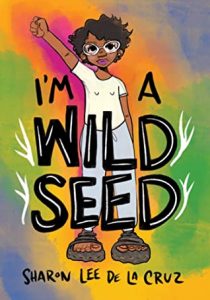Amazon Affiliate Link | Bookshop.org Affiliate Link
A colorful reminder that there is no age limit to queerness, to coming out to and term with oneself. It was heartening to see a slower “accumulation of experiences” leading the author to understanding their identity, a situation that many readers might find relatable. As entertaining as it can be to point to one incident as a defining moment (and as much as we center queer narratives around the “coming out” experience), sometimes it is not so categorical, especially when race and ethnicity come into the picture. Norms of masculinity can be heavily entrenched in communities of color, where being disempowered and oppressed in the realm of race or ethnicity leads individuals to cling tightly to feelings of power and strength they get from performing harmful behaviors considered “masculine”.
The watercolor art style is unique, and the last panel on page 24 is a powerful image.
This is a deeply personal story, a memoir that at the same time is a reminder of how many queer individuals’ lives are inextricably intertwined with the theories of gender and sexuality we become well-versed in just to understand our experiences, to justify our existence to a world that holds certain beliefs as unquestioning, “objective” fact. There is a beautiful series of panels from pages 77-81 that illustrate a pivotal moment where the author experienced art that pushed them to reevaluate their understanding of gender, and the history of colonization and imperialism that held it up.
There are subtle moments of intersectionality woven through the text, too: the way labels can be empowering when they allow us to build community, but can just as equally becomes slurs or tools of oppression when wielded with ignorance, fear or intent to hurt. How invalidating and confusing it can be when people ascribe identities to you based on appearances that do not reflect your self-perception or understanding of your place in the world.
I appreciate how De La Cruz is not prescriptive. She acknowledges both her own history of misconceptions as well as those of others. This is simultaneously a story of coming into one’s sexuality and gender identity as well as an ethnic and racial one. Our understanding of identity is intimately shaped and constructed by the media we consume and the ideas we believe, along with our actions and tangible choices. Learning to interrogate that can lead to different paths for different people, and I appreciated De La Cruz’s unabashed frankness about how tiring and imperfect the (ongoing) process is.
Pages 46-50 are harrowing reminders of the way marginalized bodies have historically been treated as “other”, about the stigmas and moral judgments that still permeate medical and political practices in this country today—about the risks faced by people who grow up in “crooked rooms”, trying to contort themselves into alignment with a distorted reality, a reality that leads marginalized people to mistake privilege for freedom. It can be difficult, uncomfortable even to attempt to move beyond entrenched biases masquerading as facts. To advocate for yourself and others. But having a community and support network can be invaluable to this process. De La Cruz’s memoir is one of the most touching I’ve read, in that she makes an effort to credit the myriad of individuals, historical and familial, who helped her on her journey. She has the perspicacity to show characters as flawed, but sympathetic, to contextualize their petty ignorance and ignominious moments without absolving them of the inequities those actions contribute to. It is short, but it packs a lot, while leaving the ending open for room to grow.

